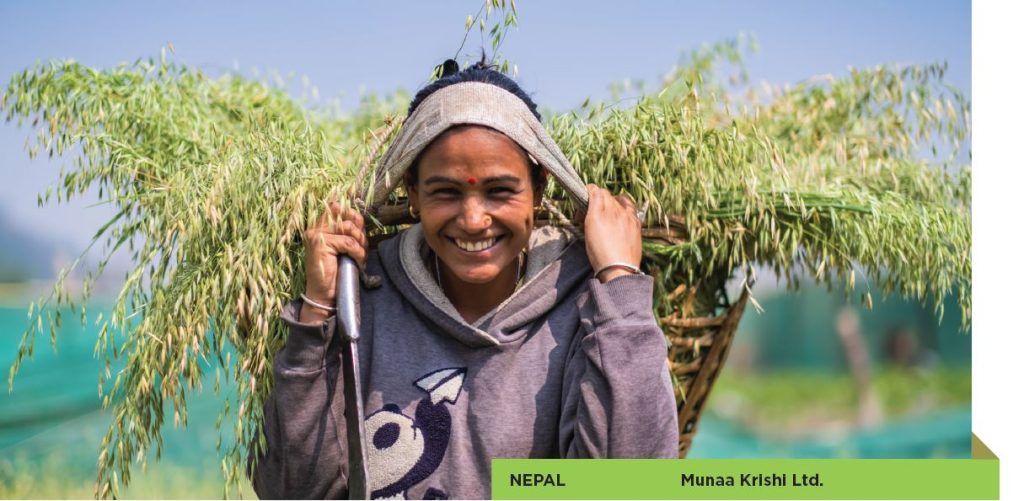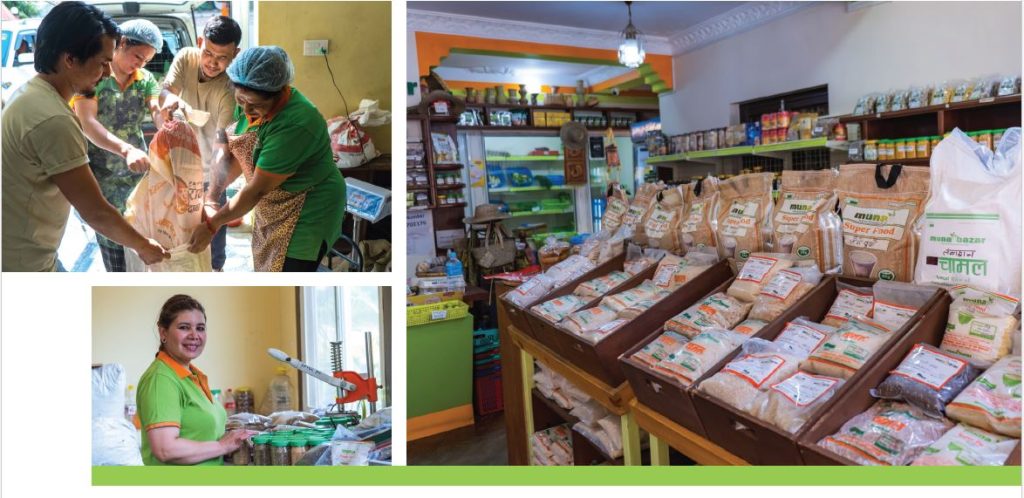
Click here to download this story as a PDF

Finding Nepali ingredients outside of Nepal can be a real challenge for the more than 5 million Nepali people living abroad. Yubaraj Gurung should know. During a short-term stay in Belgium, the businessman was repeatedly stymied in his attempts to create authentic meals from his native country due to the lack of availability of Nepali products.
Yubaraj returned to Nepal with the determination to solve this challenge. He organized a group of investors and founded Munaa Krishi Ltd., an agro-market concept known commercially as Munaa Mart, to buy products including grains, fruits, vegetables and meat directly from farmers and export these Nepalese commodities to new international markets.
Very quickly, however, Yubaraj and the Munaa Krishi team realized the need for additional business expertise to achieve their goals. With the assistance of the U.S. Agency for International Development’s Farmer-to-Farmer, or F2F program, Munaa Krishi hosted three F2F volunteer assignments to create a concrete business plan, develop a standard operating procedure (SOP) for agricultural commodities, and put into place an effective marketing strategy.
Because the concept of the agro-mart was built around the process of buying directly from the farmers, Munaa Krishi sought F2F expertise to better promote agri-businesses in Nepal while connecting farmers and their produce to a ready market. In the first F2F assignment, Aju Nyachhyon, a local F2F volunteer from Nepal, and Brad Allen Perry of the United States worked directly with the Munaa Krishi team, listening to their needs and preparing a business strategy for sustainable growth.
For the second F2F assignment, Munaa Krishi and the F2F volunteers concentrated on establishing business fundamentals. Local F2F volunteer, Pragati Sipkhan, and U.S.-paired volunteer, Kathryn Fielder, worked with board members, staff and farmers to create a SOP for the collection, transportation, processing and storage of agricultural commodities, with a special focus on rice. The SOP provides information for the staff and the senior management team of Munaa Krishi to consider during the production, collection, transportation, processing, and storage of different agricultural commodities, keeping the quality high, minimizing the post-harvest loss and making the work more efficient.

These recommendations have helped Munaa Krishi improve quality control at its operational facility at the company’s headquarters. The new SOP has also directly impacted local farmers who sell to Munaa Krishi.
For many years, Dil Bahadur Shahi, a farmer who raises goats in Lalitpur had only two options for selling goats; he could sell to a nearby meat market or wait for walk-in customers. Now he sells through Munaa Krishi, which provides a delivery person who twice a week picks up Dil’s goats which have been pre-ordered by customers. Because Dil has increased his production, he is in the process of building a slaughterhouse at his farm.
In a similar way, Dharma Shrestha was responsible for selling the milk from his dairy directly to the customer, making milk delivery rounds early each morning. Through his association with Munaa Krishi, Dharma now benefits from their delivery service, which saves Dharma the time he spent each day to deliver milk. He also is guaranteed that Munaa Krishi will buy 60% of his milk. With a regular buyer of that volume, Dharma Shrestha has added 50 more cows to his current herd of 50 and is planning to shift his farm to a bigger and better location.
The final F2F assignment addressed Munaa Krishi’s marketing needs. U.S. volunteer and branding consultant Valerie Varco created a brand and communications strategy brief with recommendations on how to approach and execute marketing campaigns to increase the efficiency with which Munaa Krishi crafts communication and markets its products.
She also made further recommendations around the creation and maintenance of social media channels.
Munaa Krishi has adopted several practices as a result of the marketing volunteer assignment. They have emphasized the local aspect of their market— local farmers, local products—and have found both a wider audience for their products and the ability to offer a fair price to local growers. Munaa Krishi has also promoted the use of local products like quinoa as a substitute for imported products and has seen demand for indigenous products increase as a result.
Currently, Muuna Krishi operates five Munaa Marts in Kathmandu and Pokhara with plans to franchise the markets in countries around the world where there are large numbers of Nepalis yearning for the food of their homeland.

The CRS F2F program is a USAID-funded program focused on reducing hunger, malnutrition, and poverty across six countries: Benin, Timor-Leste, Ethiopia, Nepal, Rwanda, and Uganda. The program runs from 2018-2023 and aims to generate sustainable and broad-based economic growth in the agricultural sector. U.S. volunteers with agricultural expertise share skills and help build capacity for farmers through short-term training and technical assistance projects resulting in more productive, profitable, sustainable, and equitable agricultural systems.
Photos by Amit Rudro for CRS